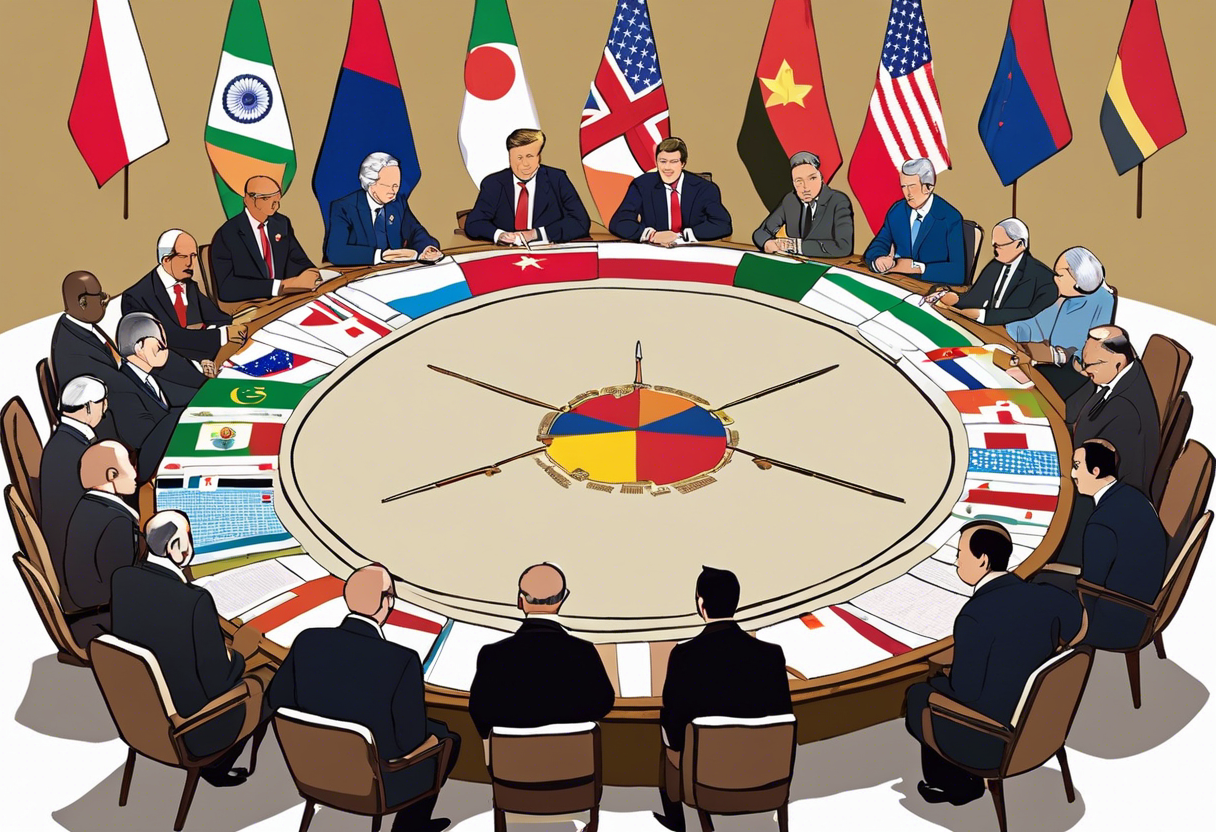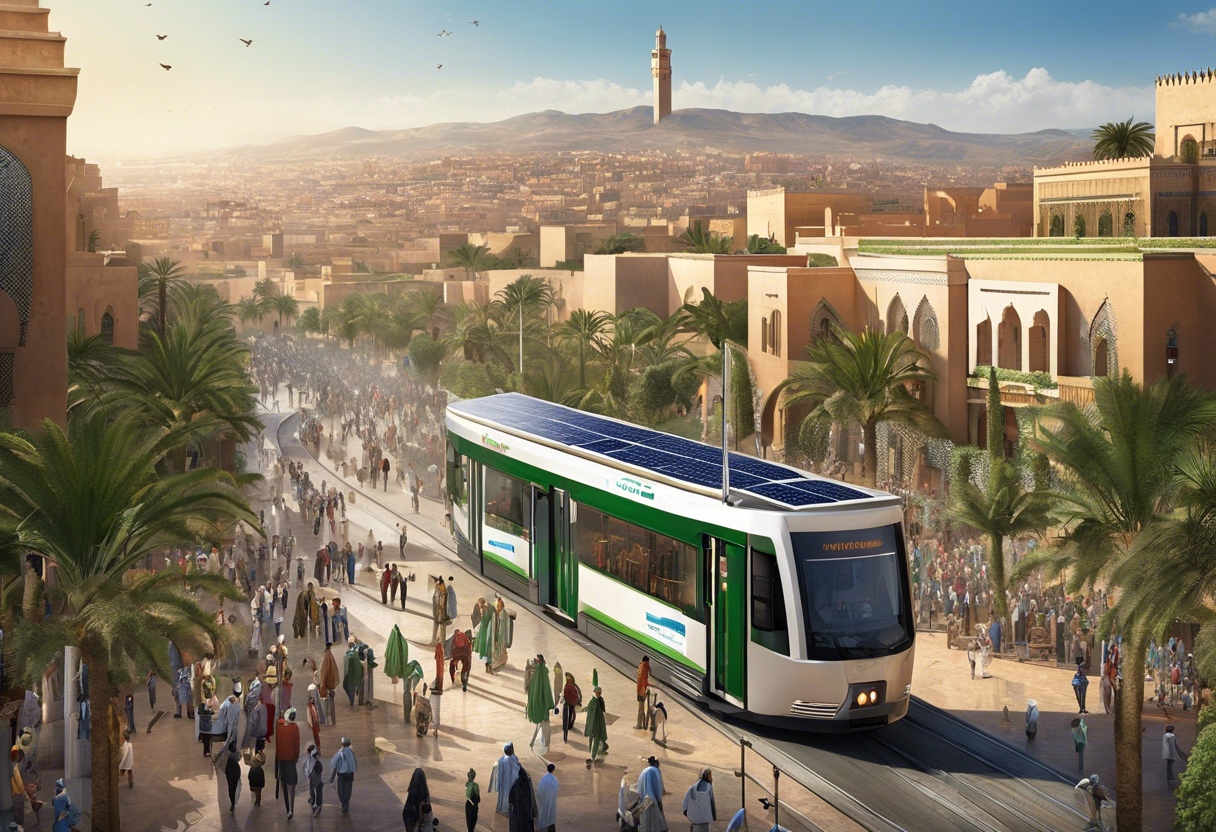Introduction to His Majesty the King Mohammed VI
His Majesty Mohammed VI, born on August 21, 1963, is the current King of Morocco. He ascended to the throne on July 23, 1999, following the death of his father, King Hassan II. Since assuming the role of king, Mohammed VI has been a key figure in shaping Morocco's political, social, and economic landscape.
With a modern and progressive approach to leadership, His Majesty Mohammed VI has implemented various reforms that aimed to improve the lives of Moroccan citizens and strengthen the country's position on the global stage. His commitment to democratic principles, social equality, and economic development has earned him both acclaim and recognition domestically and internationally.
During his reign, His Majesty Mohammed VI has made significant strides in advancing Morocco's economic growth. He has overseen the implementation of bold economic reforms, encouraging foreign investment and diversifying the country's industries. His efforts have resulted in the expansion of sectors such as tourism, renewable energy, agriculture, and manufacturing, contributing to Morocco's overall economic development.
Moreover, His Majesty Mohammed VI has been instrumental in promoting educational and social reforms in the country. Recognizing the importance of education in fostering social progress, he has launched initiatives to improve the quality of education and enhance access to educational opportunities for all Moroccans. Additionally, he has undertaken efforts to empower women, promote gender equality, and address social inequalities, making significant contributions to Morocco's social development.
His Majesty Mohammed VI's early years and education
- His Majesty Mohammed VI was born on August 21, 1963, in Rabat, Morocco, into the royal family of King Hassan II and Queen Lalla Latifa.
- During his early years, he received a comprehensive education that equipped him with the knowledge and skills necessary for his future role as king.
- He attended primary and secondary schools in Rabat, where he excelled academically, displaying a keen interest in various subjects.
- After completing his secondary education, Mohammed VI pursued higher studies at the His Majesty Mohammed V University in Rabat.
- He obtained a bachelor's degree in law and followed it up with a master's degree in public law.
- Furthering his education and expanding his knowledge base, he also pursued religious and linguistic studies.
- Additionally, His Majesty Mohammed VI cultivated expertise in economics and management, obtaining a diploma from the Paris Dauphine University and an MBA from the renowned INSEAD business school.
- His diverse educational background equipped him with a well-rounded skill set that would greatly influence his future leadership style.
- Beyond formal education, His Majesty Mohammed VI also gained practical experience and understanding of Morocco's political, social, and cultural landscape by actively engaging in various initiatives alongside his father.
- The combination of his academic achievements, hands-on experience, and exposure to different fields played a vital role in shaping His Majesty Mohammed VI's vision and approach as a leader.
The Reign of the King of Morocco
During his reign, His Majesty Mohammed VI has implemented numerous reforms and modernization efforts in Morocco, leading the country towards progress and prosperity. Here are some notable achievements during his time as king:
- Constitutional reforms: In response to the Arab Spring protests in 2011, His Majesty King Mohammed VI introduced significant constitutional reforms. These reforms aimed to enhance democratic institutions, strengthen the rule of law, and promote human rights.
- Economic development: Under His Majesty Mohammed VI's leadership, Morocco has experienced steady economic growth. The king has prioritized economic diversification, attracting foreign investment, and implementing policies to reduce poverty and unemployment. Initiatives such as the National Initiative for Human Development have contributed to improving living conditions for many Moroccans.
- Investment in infrastructure: His Majesty Mohammed VI has initiated large-scale infrastructure projects across the country. These include the development of ports, highways, railways, and renewable energy projects. These investments have not only improved connectivity but also boosted economic activity and created job opportunities.
- Promotion of education: Recognizing the importance of education in fostering social and economic development, His Majesty King Mohammed VI has made substantial efforts to improve Morocco's education system. Initiatives such as the National Education and Training Charter have aimed to enhance the quality of education and promote inclusivity.
- Efforts towards gender equality: The king has been a strong advocate for women's rights and gender equality. He has implemented legal reforms to strengthen women's rights, including the prohibition of all forms of violence against women and the promotion of gender parity in political representation.
- Diplomatic leadership: His Majesty Mohammed VI has played an active role in regional diplomacy, promoting stability and cooperation in North Africa and the wider African continent. He has also strengthened Morocco's relationships with various countries, enhancing trade and political ties.
Economic Reforms and Development

Under the leadership of His Majesty King Mohammed VI, Morocco has undergone significant economic reforms and achieved remarkable development. These reforms have aimed to modernize and diversify the country's economy, reduce unemployment rates, and improve living conditions for its citizens.
- Modernizing the Economy: His Majesty King Mohammed VI has implemented various measures to modernize Morocco's economy. One of the key initiatives was the launch of the "Emergence Plan" in 2005, which aimed to promote economic growth in strategic sectors such as industry, tourism, and services. This plan has attracted foreign investments and boosted the country's economic competitiveness.
- Diversification of Economy: The king has emphasized the importance of diversifying Morocco's economy to reduce its reliance on sectors like agriculture. Efforts have been made to develop renewable energy, manufacturing, and information technology sectors. The establishment of industrial zones and free trade agreements with other countries have facilitated the growth of these sectors and opened new avenues for trade and investment.
- Infrastructure Development: His Majesty King Mohammed VI has prioritized infrastructure development, which has played a crucial role in enhancing economic growth and attracting foreign investments. Projects like the expansion of ports, airports, and highways have improved connectivity within the country and with other regions. Additionally, investments in renewable energy projects and the construction of affordable housing have further contributed to the country's overall development.
- Promoting Entrepreneurship and Youth Employment: The king has implemented initiatives to support entrepreneurship and youth employment. Programs like "Pacte National pour l'Emergence Industrielle" have encouraged the establishment and growth of small and medium enterprises, creating job opportunities for the youth. Moreover, vocational training programs have been enhanced to equip young Moroccans with the necessary skills to enter the job market.
- Social Reforms: In addition to economic reforms, His Majesty King Mohammed VI has introduced social reforms to improve the well-being of Moroccans. The "National Initiative for Human Development" aims to address issues like poverty, education, and healthcare by providing social assistance and developing infrastructure in disadvantaged areas. These reforms have contributed to poverty reduction and improved access to essential services.
Social Reforms and Human Rights
Under the leadership of His Majesty Mohammed VI, King of Morocco, the country has witnessed significant social reforms and advancements in human rights. He has made it a priority to promote inclusivity and equality for all citizens.
- Strengthening women's rights: King Mohammed VI has implemented various measures to enhance the status of women in Moroccan society. He introduced the Family Code of 2004, known as the Moudawana, which grants women greater rights in matters of marriage, divorce, and child custody. This reform has been instrumental in empowering women and promoting gender equality.
- Progress in education: The King has placed great emphasis on enhancing the education sector in Morocco. He has launched initiatives to improve access to education, particularly for children in rural and disadvantaged areas. Additionally, the overall quality of education has been enhanced through curriculum reforms, teacher training programs, and the development of modern educational infrastructure.
- Combatting poverty: Mohammed VI has implemented various poverty alleviation programs to improve the living conditions of vulnerable populations. These initiatives include the National Human Development Initiative, which focuses on social welfare and economic empowerment, and the National Initiative for Human Development, which aims to reduce poverty and inequality through targeted interventions.
- Protecting human rights: The King has taken significant steps towards safeguarding human rights in Morocco. He has established institutions such as the National Human Rights Council to monitor and protect human rights, promote democratic values, and ensure the rule of law. Moreover, measures have been implemented to enhance freedom of expression, press freedom, and freedom of association.
- Promoting religious tolerance: Recognizing the importance of religious coexistence, Mohammed VI has implemented initiatives to strengthen interfaith dialogue and promote tolerance among different religious communities. He has emphasized the values of moderation and religious pluralism, fostering an atmosphere of harmony and understanding among diverse religious groups.
Foreign policy and international relations

One of the key areas in which King Mohammed VI has demonstrated effective leadership is in the realm of foreign policy and international relations. Throughout his reign, he has consistently worked to strengthen Morocco's position on the global stage and forge meaningful partnerships with countries around the world.
Under His MajestyKing Mohammed VI's leadership, Morocco has pursued a proactive and dynamic foreign policy, both within its immediate region and beyond.
The King has placed great emphasis on strengthening political, economic, and cultural ties with African countries, emphasizing the importance of South-South cooperation. Morocco's return to the African Union in 2017 after more than three decades of absence is a testament to the success of these efforts.
Moreover, His Majesty King Mohammed VI has actively sought to position Morocco as a key player in regional and international affairs. He has taken on a mediator role in several disputes, including those in Mali, Libya, and the Western Sahara, demonstrating his commitment to promoting peace and stability in the region. His diplomatic efforts have been widely recognized and appreciated by the international community.
The King has also focused on enhancing Morocco's economic relations with countries across the globe. Through strategic partnerships and investment initiatives, he has attracted significant foreign direct investment and promoted trade relations, which have contributed to the country's economic growth and development.
Furthermore, His Majesty King Mohammed VI has been an advocate for intercultural dialogue and religious tolerance. Through initiatives like the Mohammed VI Foundation for African Ulema, he has fostered cooperation and understanding between different religious communities, promoting peaceful coexistence and countering extremism.
Public opinion and legacy

1. Public opinion
Public opinion of King Mohammed VI has generally been positive throughout his reign. He is regarded as a modern and progressive leader who has implemented significant political, economic, and social reforms in Morocco. The King has been praised for his efforts to promote social justice, improve access to education and healthcare, and reduce poverty in the country.
Moreover, King Mohammed VI is seen as a unifying force and a symbol of national pride for Moroccans. He has worked towards fostering a sense of unity among the diverse ethnic and religious communities in Morocco. His commitment to protecting the rights of women and promoting gender equality has also garnered support from both the domestic and international communities.
2. Legacy
His Majesty King Mohammed VI's legacy is marked by his efforts to modernize Morocco and strengthen its position on the global stage. His leadership has been characterized by a focus on economic development, which has attracted foreign investment and boosted the country's GDP.
His commitment to political reform has led to the establishment of a more pluralistic political system and the devolution of some powers to the elected government. This has helped to enhance political stability and promote democratic practices in the country.
The King has also been dedicated to promoting moderate Islam and countering radicalization. He has taken active steps to promote religious tolerance, engage with religious leaders, and combat extremist ideologies, both within Morocco and internationally.
Additionally, His Majesty King Mohammed VI has been actively involved in diplomacy and has played a crucial role in fostering relations between Morocco and other countries in Africa, the Middle East, and Europe. Through various diplomatic initiatives, he has worked towards boosting regional cooperation and advancing Morocco's influence in the global arena.
Overall, His Majesty King Mohammed VI's leadership and achievements have left a lasting impact on Morocco's development and modernization. His efforts to promote social progress, economic growth, political reform, and international diplomacy have positioned Morocco as a prominent player in the region and a model for other nations undergoing similar transitions.
The future of Morocco under His Majesty Mohammed VI

Under the leadership of His Majesty Mohammed VI, Morocco is poised for a promising future. With his visionary approach and commitment to modernization, the country has witnessed significant advancements in various sectors.
- Economic Growth: Through his economic reforms and policies, His Majesty Mohammed VI has focused on diversifying the economy and attracting foreign investments. This has resulted in increased job opportunities and improved living standards for the Moroccan people.
- Social Reforms: Recognizing the importance of human rights, His Majesty Mohammed VI has initiated several social reforms aimed at promoting equality and inclusivity. Efforts such as the Family Law Reform and the National Initiative for Human Development have helped empower women and marginalized communities, fostering a more equitable society.
- Infrastructure Development: One of the key priorities of His Majesty Mohammed VI has been the development of infrastructure. The construction of new highways, railways, and ports has enhanced connectivity and facilitated trade within and outside the country. Such developments have also boosted tourism, a vital sector for Morocco's economy.
- Renewable Energy: In response to global environmental concerns, Morocco has become a pioneer in renewable energy under His Majesty Mohammed VI's leadership. The country has made significant strides in harnessing solar and wind energy, propelling it towards a sustainable and greener future.
- Regional Integration: His Majesty Mohammed VI has actively sought to strengthen Morocco's ties with other African nations and promote regional cooperation.
The future of Morocco under His Majesty Mohammed VI looks promising, with a continued focus on economic growth, social reforms, sustainable development, and regional integration.
As the country embraces modernization and innovation, it is positioned to become a thriving hub for trade, investment, and cultural exchange.


